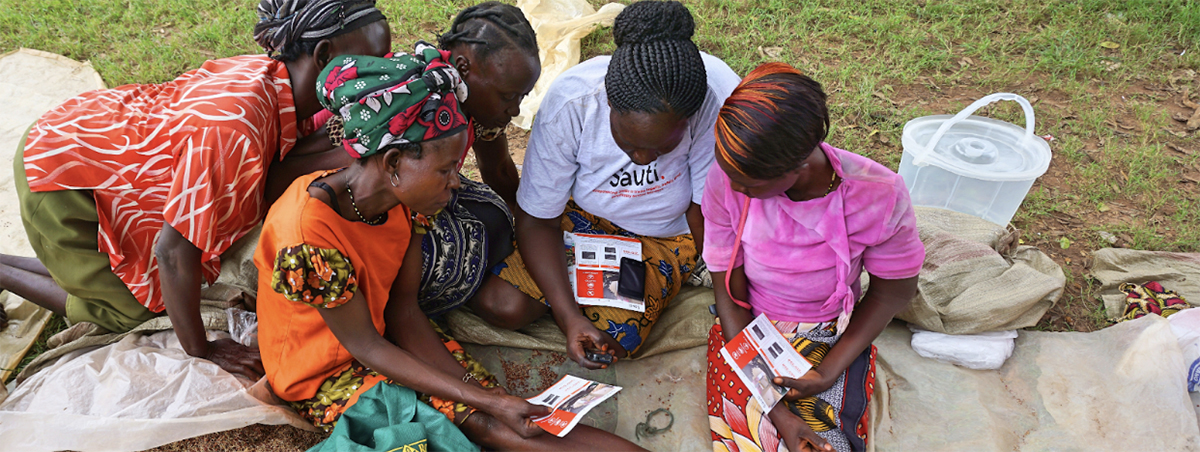September 8, 2022
Sauti East Africa is a social enterprise that combines development research and tech solutions to address the digital information gap facing women in trade, particularly cross-border agricultural trade.


Nairobi-based social enterprise Sauti builds, implements and scales mobile trade and market information solutions for small and medium enterprises (SMEs) across East Africa. Since 2017, it has directly reached over 70,000 business operators in “low-technology” environments in Kenya, Uganda, Rwanda, and Tanzania and indirectly empowered many more traders as partners in program design and technical implementation.
The company’s software allows growers - particularly women without internet or smartphone access - in East Africa to receive information directly to their phone via text about prices and region-specific trade information. Earlier this year, Lara Gilmour chatted to CEO and co-founder Lance Hadley to find out more.
I founded the company with co-founder Julia back in 2016. We originally started when I agreed to build the tech for an anti-corruption platform Julia had an idea for. So I have gone from being the CTO to the CEO and now I’m sort of steering the ship. After four years our anti-corruption platform has moved about $1,000,000 worth of funding through the company and we're in four countries. Our information content extends from anti-corruption reporting and procedures as well as trade procedures. But we also provide market prices, exchange rates and weather forecasts.
The use case for Sauti was very clear. Most cross-border traders don't have a smartphone, only 10-18 percent do and they’re also from peripheral groups, for example women. Women without a smartphone lack access to trade and legal information.
But, we identified that everybody had a feature phone. It's what people are using for M-Pesa (a money transfer service). So we took advantage of that. We built on an SMS platform and USSD platform. This enabled them to report corruption incidents but also to look up information on their rights and trade information.
In our early customer discovery surveys with Julia, we heard that our users never knew exchange rates and often got gouged by the money-changers at the border. So we put exchange rates on the platform and it turned out to be one of our most widely used features.
Recently one of the big pushes that we've had is climate forecasting and more seasonal forecasting. That information is available on websites but not to people without smartphones. That's where Sauti can step in.
So we really did stumble into this method, and it really took off. There was a time when we used to get ten users a day. But in the last 24 hours we've had 340 odd users, 200 in Kenya alone. So the platform really has kind of evolved beyond its initial implementation. But I would say information accessibility and equity are still the core.
Information asymmetry and low smartphone adoption rates are the big ones, for me. Surveys will always say they don't have enough capacity or they don't have enough money. And that's true - but that’s a larger structural issue. We're targeting more of the root causes behind that, for instance the gender inequity around accessing information. I think the development community is kind of laser focused on priorities that are less important and look closely at the dollars and cents.
But their approach targets those who make the money. Donors will say, for instance, that they're targeting SMEs of up to 100 people. It's easier to work with companies that are larger because they're more formalized and so on. And this means that you end up working with large-scale male dominated companies. And the reason you work with them is because they have ten-ton trucks that can move lots of products. And your reporting can look pretty good. If you look at the Uganda Bureau of Standards on cross-border trade, the way they monitor cross-border trade: they sit at the border and they count the trucks go by from 9am to 5pm. But our estimates show up to 80 percent of cross-border trade is done by women, who don't use trucks and deal in very small quantities.
These women move across the border about once a week and they carry about $20 worth of profit. And either they themselves carry it or they hire a motorcycle. And this is not being counted and it's not being targeted by trade facilitation efforts. There is a lot of gender equity funding but that's always framed as increasing opportunities for women to participate in business rather than targeting women already participating in business. A lot of the facilitation efforts are inappropriate, for example building a virtual marketplace on a website, which ignores the issue of access to technology.
The women have an average of seven dependants and the small farms are on average 0.2 acres in Uganda and 0.4 in Kenya. They are mostly producing for their family and trading a very small surplus.
An academic characterised this trade as small transactions and high frequency. A farmer will grow their goods and many transactions will follow but the produce will not be moved very far. Many will take it to the market themselves and take whatever price they can.
Cross-border trading is an avenue of economic empowerment for people who are not very well-educated. For many women, it's the only work available. Price differentials drive the trade. In Uganda, prices are much lower than in Kenya. But crossing the border has costs. There can be regulatory support, for example, where they don't pay border taxes if they are trading less than $2000. But many of the traders aren’t aware of the regulations and border guards can charge them inappropriately. Other costs come from the fact many are crossing at unofficial points, which creates risk of robbers and being spotted by border guards.
Well Julia is my co-founder and there is also specifically Sylvia, in the senior operations role. Sylvia really does run the show on the ground.
Oh, absolutely. There are big advantages for Sauti being majority staffed by women, both when we ask women what they want to see on this platform but also when discussing sexual harassment. It's the male-dominated cross border trader associations that get the attention of the donors. But Sauti is engaging women about how to facilitate their trading activities.
Well we did a YouTube video and put it on WhatsApp and only 27 people saw it. Workshops don’t work because women are busy at work, or at home cooking breakfast, then dinner. But we have had some big boosts from running radio ads at 6am and 7pm. We do training sessions and we compensate women for missing a day of work.
But word-of-mouth has really taken off. We have not done any activities in Rwanda since 2017 but we keep growing there. In Tanzania, we haven’t done any activities since 2020 but we had 64 new users today. We have never done a marketing campaign that targets men. But about 50 percent of our users are men. That must be because of word-of-mouth.
Word-of-mouth is how people get their information. They call people up on the other side of the border to ask for prices to see if it is worth taking their produce to market. So what we are doing really is we're verifying and adding to that information, especially as it relates to some of the regulations.
I think what men are doing is verifying the information they already have and women are getting the information they never had.
We have been approached by big traders that want to see historical prices. But it's not something we've focused on. We offer spot prices so women can see the price now.
To be honest, there is a discussion at Sauti about which direction to take. The future I see for Sauti is improving the picture of cross-border trade. We are launching a trade insights portal and we also do bigger surveys, of up to 6000 people, rather than the normal ones that involve around 300. I'm really proud of this, as it can paint a more accurate picture.
We connect women to third-party information, for example exchange rates. The use case for our information is as a negotiating tool. With exchange rate knowledge they are empowered.
In terms of education, we are limited because we are just providing access to third party information. We rely on the information ecosystem to develop so that we can link to that information. That's what we did with Covid by linking to official sources. And we do the same with legal information.
Our workshops have an education element. But we also educate by, for example, having an option on our menu on our website that shows how to get a business number which is required in order to get a certificate of origin certificate. This was something we were asked lots of questions about.
So education is a logical next step - but it’s also super expensive.
Funders respond to data and so converting the discovery conversations we have with women into data is important. It is the language that donors speak. Other areas include improving the market information. Cross-border traders and farmers are well-placed to provide information on trade and prices, which are often dominated by the big cities. We’d also like to try to find market prices for the Kakuma Refugee Camp and the Mandera Triangle region. But, the original mission of Sauti was anti-corruption. Officials have told us they get reports but they are hard to verify. So Sauti can provide a platform for the reporting of abuses.

East Africa / Sauti East Africa / digital information gap / women in trade / cross-border agricultural trade / Nairobi / Kenya / Uganda / Rwanda / Tanzania / Lance Hadley
Disclaimer: The opinions or views expressed in this publication are those of the authors or quoted persons. They do not purport to reflect the opinions or views of the Global Pulse Confederation or its members.